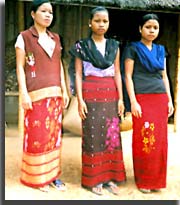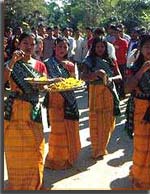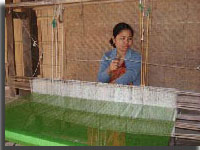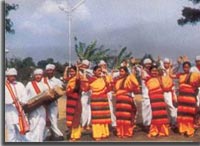History :
The true ethnic Tribal Community of northwestern parts of Assam are Bodo Tribe & the Kachari is the sub branch of the Bodo. The Bodo Tribe resides in the Brahamaputra valley. Bodo Tribes are known to be the earliest settlers in Assam. They are the first to cultivate rice and rear silkworms.They are superstitious by nature and believe in rebirth. The word 'Bodo' has been derived from the word 'Bod' means Tibet. They are the largest ethnic and linguistic group of tribes. Bodos are a peace-loving people.

A Bodoland Territorial Council is formed to save & protect the culture, language and identity of Bodos. It was managed and headed by All Bodo Students Union (ABSU) and an armed militant group called the Bodo Liberation Tigers (BLT). The land given to the Bodos was called as Bodoland. Most of the Bodos arrived from Bhutan Passes. The 6th Schedule of the Constitution of India has conferred Bodo Tribal Community the status and prestige of Plain Tribe. Kokrajhar town is regarded as the hub of Bodo tribal Community.
Place /Location (then and now) |
Assam |
Population |
Close to 1 million |
Languages spoken |
Tibeto - Burmese language |
Religion/God |
Plant called siju is worshipped
|
Food |
Rice, Milk |
Culture
Culture of the whole society of the Bodo Tribe includes dancing, singing etc. One can find the surnames of Bodo Tribe as Bargayary, Bodosa, Boro, Owary, Wary, Ishwary, Goyary & Dwimary. They use the beautiful language of Bodo and some people in primitive age used Roman and Assamese Script. Bodos have quite exquisite dresses which are exhilirating the beauty and glamours of women. Dokna is the dress worn by Bodo women which they themselves knit on their own hands. Shawls form the major fashion among Bodos and thus loom is the most important thing used in the courtyard of the Bodo House. Bodos in the ancient times used to pray to their forefathers.
The famous folk dances of Bodo Tribe such as Bardaichikhla and Bagurumba are extremely colorful. The Bodo Tribal community follows a common system of marriage in all villages. Elders in the village fix the bride. Bride money is paid and they do not marry from other communities. Sunday is the best day for a Bodo Wedding. There have a taboo against marrying within the same clan. The groom is asked to stay with his father-in-law's family. The customs of Bodos have a ritualistic naming ceremony, when a cock is offered to the Gods for the welfare of the baby.
Food
Bodo have favoritism and taste buds for some of the mouthwatering dishes. They are very much fond of conventional drink called Zu Mai, Zu means wine and Mai means rice. Rice is the main staple food but are savored with a non vegetarian dish like fish or pork. They now usually prefer non-vegetarian dishes. The main dishes are Oma Bedor, Onla and Narzi.
Languages
The Bodos speak Tibeto - Burmese language. Nowadays the Bodos have accepted the Devanagari Language. Bodos have a language of their own called Deodahi.
Occupation

In early days Bodo tribes practiced farming and cultivation. Rice farming, tea plantation, pig & poultry farming, Silkworm Rearing is a major occupation of any Bodo Tribe. They have also developed in the years the art of craftsmanship by creating several products from bamboo.
Weaving is also the popular occupation among Bodos. In very early age girls of Bodo Tribe learn the art of weaving.
Festivals

The other festivals which Bodo Tribe celebrates are Hapsa Hatarani, Awnkham, Gwrlwi, Janai, Bwisagu and Domashi. Among all the Kherai Festival includes singing, dancing and drumming celebrated with much rejoice.


